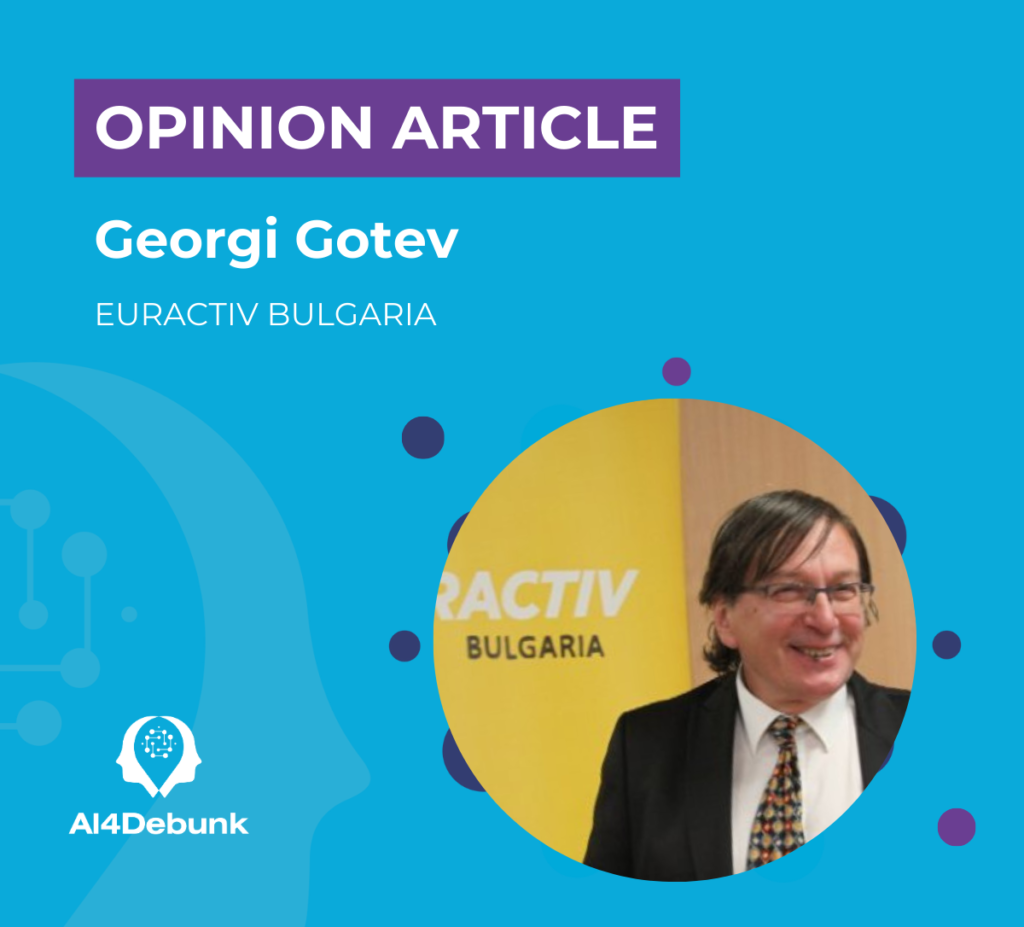In recent years, me and my colleagues have spent thousands of hours digging the disinformation dirt. The first thing I would like to say is that this is not a pleasant experience.
As a journalist, I have always had the reflex of reading only reliable sources of information. This has kept me on the safe side, but at the same time, I have noticed that other people – even colleagues – have fallen in the trap of the widespread fake news and disinformation, for which there were no safeguards.
It was on the Facebook platform where I first noticed how vulnerable people are when faced with fake news. People I know posted obvious fake news and I started to react, writing messages: “this is fake”. Some people reacted positively and removed the content, others unfriended me.
I then realised that fake news circulate a lot as private messages. I received my share and kept reacting: “this is fake news”. On one occasion, the person who sent me a link to fake news was a journalist I knew professionally. I asked: “why are you spreading fake news?” The person answered: “I didn’t realise this was fake news, I found it interesting”. This candid answer made me think about it. Indeed, fake news are usually interesting, and this is why they get a lot of readership, much more than normal news.

Years ago, I used to produce spoof articles for April 1 and, surprisingly, they got a lot of success – some were even republished as real news in other countries. This is how I realised fake news are a dangerous thing, and I stopped writing April Fool’s Day articles, although I really had fun doing them.
At about the same time, I learned that a group of youngsters in what is today North Macedonia were publishing on websites fake but interesting articles, bringing a lot of readership worldwide and substantial revenue from Google advertising. I also noticed the bias of many fake stories, which were obviously in favour of Putin’s Russia. Many of these articles made the EU and the authorities of our countries look stupid.
Then I remembered our experience – I am from Bulgaria – with UK tabloids, which created panic around the massive arrival of Bulgarians on the British isles from January 1, 2007, when our country joined the EU. Many UK colleagues spent time at the airport to film the crowds, although nothing happened.
Boris Johnson was a journalist in Brussels for the Daily Telegraph and was the first to invent fake stories about the EU [1]. These stories got a lot of success. Colleagues told me that chief editors of other tabloids asked their correspondents to write similar stories, even if they are not true. The result of massive EU-bashing by UK tabloids was Brexit.

There was vast disinformation during the Covid crisis, mainly by anti-vaxxers. When the Covid crisis ended, it had produced a community of anti-vaxxers who almost automatically joined the pro-Putin camp in the context of Russia’s aggression against Ukraine [2].
In Bulgaria, a political party took advantage of both the anti-vaxxer movement and the pro-Putin sentiments. This is how a powerful party, Vazrazhdane (Renewal), was born. Today they have 38 MPs in the 240-seat parliament.
Bulgaria, I realised, was more vulnerable than other countries to disinformation, especially to pro-Russian disinformation. One of the reasons is that part of our population mix the traditional pro-Russian sentiments that have historic roots with alignment with the Kremlin’s policies. But there are more reasons than that.
When 25 years ago, as a journalist, I was using sources such as Reuters, AFP, or the BBC, many of my colleagues at that time were relying on lenta.ru, a Russian website. The main reason was the language – translating from Russian was easier for them. But as a result, the international page of a newspaper could appear completely distinct, as if we were living on different planets.
To date, Russia is spending a lot of money on Bulgarian media, officially and unofficially. In addition, Russia also counts on the “useful idiots” who repeat their messages for free. And there are plenty of useful idiots among the politicians, media, and blogosphere.
I have lived in Belgium for the last 17 years. These days, I compare Bulgaria and Belgium daily, and there is an enormous difference in how much Russian propaganda has penetrated the public sphere: very much in Bulgaria, very little in Belgium.
When Russia started its aggression against Ukraine, I was in Sofia and switched on my TV to find, to my surprise, the Russian TV1 channel churning out propaganda talk shows. Many Bulgarians understand Russian and, apparently, many were tuning in.
But as I continued browsing the channels, I came across the TV channel of BSP, the Bulgarian Socialist Party, where a TV anchor – who was also an MP – was repeating the messages of Russian propagandists in Bulgarian. Bulgaria has a widespread view that “we should hear all opinions”. This is also the official point of view of the Bulgarian regulator.

I now have the capacity of publisher of EURACTIV Bulgaria. Our media has won two consecutive projects, one under EMIF, the European Media and Information Fund, and another under the Horizon Europe programme of the European Commission.
I think the specialised NGOs and the EU institutions understand that Bulgaria, possibly together with Slovakia, is among the most vulnerable to Russian disinformation.
Under these projects, we have spent a lot of time analysing the pervasive fake news in Bulgaria. At the recent snap parliamentary elections last April, a new party, Velichie (Greatness), emerged. Everybody was surprised – opinion polls were unable to predict its appearance and electoral success.
But at EURACTIV Bulgaria we were not. We had come across ‘mushroom websites’ such as Krasivabalgaria, Krasivburgas, Krasivbatak, Krasivavarna, Krasivveligrad, Krasivovetrino, Krasivvalchidol, Krasivdobrich, or Krasivaprovadia. These websites were clearly preparing the ground for a new political player.
Anti-EU content and climate-sceptic propaganda on such websites was further amplified on social media, mostly Facebook, and as a result, the “likes” were transformed into votes.
At AI4Debunk, EURACTIV Bulgaria will leverage its extensive experience in fact-checking and fake news exposure in Bulgaria to play a key role in combating disinformation across Europe and promoting a more trustworthy online environment. As part of the project, we will identify disinformation narratives and collect datasets of fake multimedia content. This data will help build advanced knowledge graphs, forming the foundation for the AI-powered tools that will be the project’s main outcome.
References
[1] Greenslade, R. (2020, February 23). Boris Johnson is the ultimate purveyor of fake news. The Guardian. https://www.theguardian.com/politics/2020/feb/23/boris-johnson-is-the-ultimate-purveyor-of-fake-news
[2] Kayali, L. & Scott, M. (2022, March 17). Anti-vax conspiracy groups lean into pro-Kremlin propaganda in Ukraine. Politico. https://www.politico.eu/article/antivax-conspiracy-lean-pro-kremlin-propaganda-ukraine/
Download full article in pdf here.
ABOUT GEORGI GOTEV
Georgi Gotev is a journalist specialised in EU affairs, active in Bulgaria in the 1990s and in Brussels from 2007 to the present. In 2019, he founded EURACTIV Bulgaria as part of the EURACTIV pan-European media network focused on EU affairs. EURACTIV Bulgaria brings news from across Europe to the Bulgarian audience, and informs the EURACTIV network on a daily basis about developments in Bulgaria.





